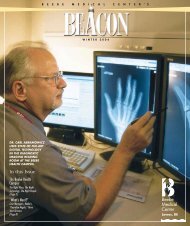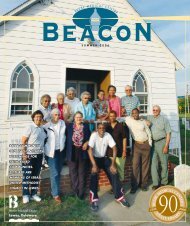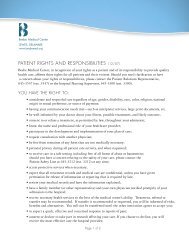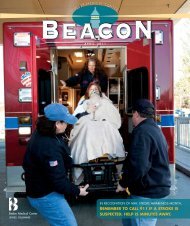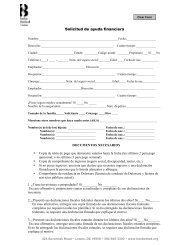Beacon-Summer 2005 - Beebe Medical Center
Beacon-Summer 2005 - Beebe Medical Center
Beacon-Summer 2005 - Beebe Medical Center
Create successful ePaper yourself
Turn your PDF publications into a flip-book with our unique Google optimized e-Paper software.
and Chairperson of <strong>Beebe</strong>’s Diversity Committee.<br />
“Our team developed a diversity manual tailored for<br />
<strong>Beebe</strong> and its patient base.”<br />
So far, the result is a diversity program with a<br />
resource manual that focuses on the Hispanic culture,<br />
the African-American culture, the American Indian<br />
culture, sexual minorities, and body size. The manual<br />
is used in an ongoing employee education process.<br />
Diversity awareness has allowed <strong>Beebe</strong> to better<br />
understand its patients and improve its services.<br />
In regards to the growth in the Hispanic population,<br />
<strong>Beebe</strong> hired its first full-time, certified Spanish interpreter,<br />
Alina Ferrer. A language bank made up of more<br />
than 20 employees and three volunteers who speak<br />
different languages was prepared and distributed to<br />
all departments. More than a dozen speak Spanish;<br />
the others speak German, Japanese, Korean, Lithuanian,<br />
and Polish.<br />
Statistics show that the African-American population,<br />
on average, was not getting cancer screenings<br />
done in time to catch the disease in its early stages.<br />
<strong>Beebe</strong>’s own numbers at the Tunnell Cancer <strong>Center</strong><br />
indicate that 32 percent of African-American patients<br />
begin treatment in the later stages of cancer, while<br />
only 10 percent of white patients begin treatment at<br />
later stages. Conversely, about 47 percent of white<br />
patients are seen at stage one, where treatment is most<br />
beneficial, compared to only 29 percent of African-<br />
Americans.<br />
Last year, to increase these numbers, <strong>Beebe</strong> created<br />
a Minority Outreach Committee focused on improving<br />
overall health and life expectancies. This summer, some<br />
committee members visited South Bend Memorial<br />
Hospital in Indiana, an institution known for its community<br />
outreach efforts. The group wanted to learn<br />
about efforts that also may benefit communities surrounding<br />
<strong>Beebe</strong>.<br />
<strong>Beebe</strong> research also has shown that another<br />
one of its growing patient bases is what the manual<br />
describes as “sexual minorities,” or “. . . those who are<br />
not exclusively heterosexual.” One way the <strong>Medical</strong><br />
<strong>Center</strong> is meeting the needs of this community is<br />
to bring health education, screenings, and referral<br />
efforts to Camp Rehoboth, an organization focused<br />
on helping the GLBT community.<br />
Odette Wright, a religious leader with the<br />
Nanticoke Indian tribe, who teaches courses to <strong>Beebe</strong><br />
staff on the Nanticoke culture, believes that if there<br />
is understanding, there is respect—and with respect,<br />
people can come together to find solutions. ■<br />
Odette Wright, a member of the Nanticoke Indian tribe, helps <strong>Beebe</strong> bring comfort to American Indian patients.<br />
5


